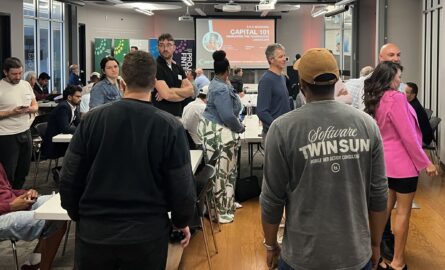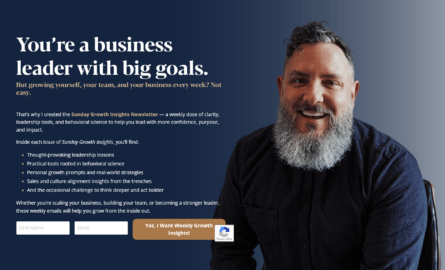
Phil Shmerling in a panel discussion at Twende Summit 2019
As a child, Phil Shmerling would scour the newspaper’s stock quotes with his father, investing only in companies he thought were the “coolest” at the time – baseball cards and Toys ‘R Us made the top of the list. While Phil’s financial expertise has greatly matured since then, listening to him describe Nashville’s entrepreneurial spirit, it’s clear his excitement for investing in people he believes in has only amplified with age.

Phil Shmerling, Founder of InCrowd Capital & SVP and Relationship Manager at Studio Bank
Shmerling was the founder of InCrowd Capital, an angel investment network with over 53 active members who helped fund 14 different companies, and now works as Senior Vice President and Relationship Manager at Studio Bank. “We’re set on serving creators,” he told listeners in his episode of the Navigate podcast.
“There are not a lot of bankers in Nashville who really understand startup business models and startup processes,” he said, “and of course, if you don’t have three years of operating income or profitability, you’re probably not a good client for them.”
Unlike traditional banks that generate revenue by lending and then recovering money, Studio Bank’s mission is to build out an ecosystem for thought leaders and investors in the entrepreneurial community, one that supports startups in the earliest stages of raising capital.
But as we learned from Shmerling’s interview, navigating the complicated landscape of funding your first company can be a daunting task filled with avoidable errors. Here’s just a few tips he offered on how early-stage entrepreneurs can find venture funding, and some creative ways to use it once it’s secured.
Two Types of Investors: Professional and Non-Professional
The first lesson Shmerling covered was to classify investors into two categories – professional and non-professional.
“Professional investors are what I would call venture capitalists, angel groups or any individual angels,” who invest regularly in startups, he explained. “They are actively seeking investments to make into early-stage companies.”
But Shmerling cautioned listeners that most venture capitalists won’t invest in just ideas, a common misconception of the funding process. “Every entrepreneur, myself included [when starting InCrowd], thinks they have a great idea [or product] and they’re just going to go out and tell people about it, and they’re going to [get an investment] . But professional investors want to see that dreaded T-word,” he said. “Call me back when you have more traction.” Shmerling said entrepreneurs hear that one all the time.
>
““It means proof that you can execute. They don’t want to write you a check just to help you test your assumptions.””
It’s why professional investors account for only 3% of all startup funding. The other 97% of capital, Shmerling explained, often comes from the second type of investor – the non-professionals.
Beyond the obvious – friends and family – Shmerling defines the non-professional investor as anyone with a vested interest in the company. Surprisingly, that may include your own customers. “I think a lot of entrepreneurs don’t really think about customers as much as they should,” he said.
For a startup founder who is “pre-revenue,” the notion of asking an early customer for investment money may sound a bit presumptuous, perhaps even unrealistic. But Shmerling suggested it’s just a matter of getting creative with the pitch.
“You can go to them and say write me a check for $50,000 and I’ll give you $60,000 worth of purchasing power,” he offered as an example. “Most companies I know that have started in Nashville have gotten their funding, their first check, from a customer who paid them in advance,” he said.
By offering discounts to customers for pre-paying or buying in bulk, or even equity shares in the business for investing, entrepreneurs can engage their own clients to help fund their startup.
The approach worked for Shmerling. “It was the first seven customers that paid for me to launch my business,” he said, referring to InCrowd.
Three Unique Ways Early Stage Entrepreneurs Find Funding
Shmerling believes these days there are countless ways entrepreneurs can secure investment capital at the early stages of their startup. He outlined some of the most common for our listeners.
Crowdfunding. Platforms like Kickstarter, Indiegogo and WeFunder are popular crowd-sourced investment vehicles. “They’ve proven that people are willing to pay you for a product that doesn’t exist yet,” Shmerling said.
But crowdfunding also reveals another common mistake he sees entrepreneurs often making, a rush to market without laying the proper groundwork.
>
““Entrepreneurs think crowdfunding is a shortcut. You can’t just show up one day and say hey look how great my idea is. You have to lay the groundwork early. You have to say here’s what I’m working on, here are the milestones I plan to hit.””
Bootstrapping. Similar to crowdfunding, bootstrapping is another creative way for early stage entrepreneurs to find capital. Successful bootstrapping campaigns may range from asking friends and family for assistance to reaching out to your customers for an investment. “I want to make it clear that you can get funding from your customers,” Shmerling said.
But the pitfall Shmerling warned about with bootstrapping is waiting too long to ask for an investment. “A huge mistake I hear entrepreneurs say all the time is we don’t want to talk to investors or customers yet because we don’t have a product to show them.” Shmerling argued that is the exact right time entrepreneurs should seek out capital, to help build a working prototype, which can then include customer feedback.
Angel Investors. According to Shmerling, angel investors are people who not only believe in your startup, but who may also know your industry well. Beyond just money, angel investors can help you with connections and other resources you will need to get your product launched.
There is, of course, the elusive fourth option for an early-stage entrepreneur seeking startup funding. It’s turning to venture capitalists like Monique Villa of Mucker Capital.
We caught up with Villa backstage at the recent 2019 Twende Summit, where founders of color gathered for a single mission – to connect with the networks, knowledge, and resources to help them grow beyond the first 3 years of their startup.
Villa represents the professional investor category Shmerling described, the financial backers of only 3% of all startup funding. Villa presented at Twende on ways for early stage entrepreneurs to become more “investable.”
One tactic she offered was not to confuse a venture capitalist’s investment discretion with ego.
>
“When interacting with investors, the concept that the investor is in a place of power is a complete fallacy.”
“By definition we are service providers who are providing capital for founders so they can build their businesses.” It’s why she suggested to think twice when seeking support from investors with a power trip.
“Venture capital is one option,” Villa stated, but “it’s not the option.” She told listeners that despite what many entrepreneurs believe, VC funding should never be the “goal” either. Securing venture capital “does not define success nor prevent you from being a success without it.”

At the moment, Villa is researching the thriving ecosystems of the Southeast. She believes Nashville’s population density is a tremendous asset to the region, but also the surrounding depth of knowledge, resources and industry expertise. “If you combine those things and then add in the fact that people are enthusiastically moving here,” Villa shared, “I believe this is the region that will really explode in the next couple of years.”
Shmerling agrees. It’s why he said it’s a “great time to be a startup in Nashville.”
“A Great Time to be a Startup in Nashville”
As part of his new position with Studio Bank, Shmerling said the process to build an ecosystem for entrepreneurs and investors is a 30-year process. “I’d say we’re about 10 years in,” he said of Nashville’s status. The next step is to get successful angel investors to reinvest in the community.
“The way it starts is entrepreneurs create great businesses. Their exits may be anywhere from $10 to $50 million. Then they become angels themselves and start writing checks for new startups to help the next wave of companies get enough funding to get to $100 million dollar exits.”
In the meantime, Shmerling said the most important thing for an early-stage entrepreneur to do is start with the end in mind. “You have to know where you want to grow your company. What do you want it to look like in 5, 10, 15 years,” he said.
>
““I tell entrepreneurs if you build a great business, people are going to be throwing money at you. But you can’t just convince people that it’s a great business; you have to show them it’s a great business.””
To hear more advice from Phil Shmerling on funding your startup as an early stage entrepreneur be sure to listen to the full episode above. Phil And don’t forget to subscribe to Navigate wherever you get your podcasts.
HAVE TROUBLE NAVIGATING ALL OF NASHVILLE’S RESOURCES? TAKE OUR FREE NAVIGATION ASSESSMENT TO BE CONNECTED TO THE RIGHT RESOURCE.
Once you’ve completed the assessment, a friendly EC team member will reach out to guide you with a few recommendations. As a non-profit, it’s our mission to champion YOU. We’re in your corner.

SUBSCRIBE IN YOUR FAVORITE PODCAST APP:
Apple Podcasts • Google Play • Spotify • Stitcher • Overcast • Breaker • TuneIn



